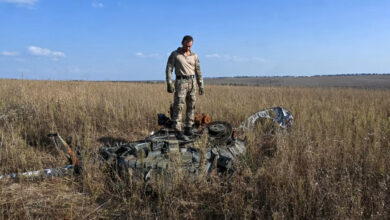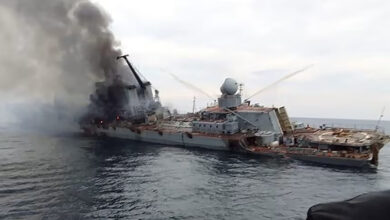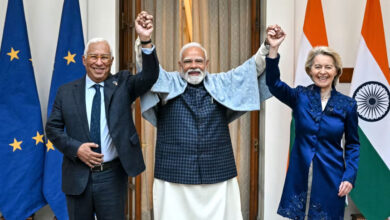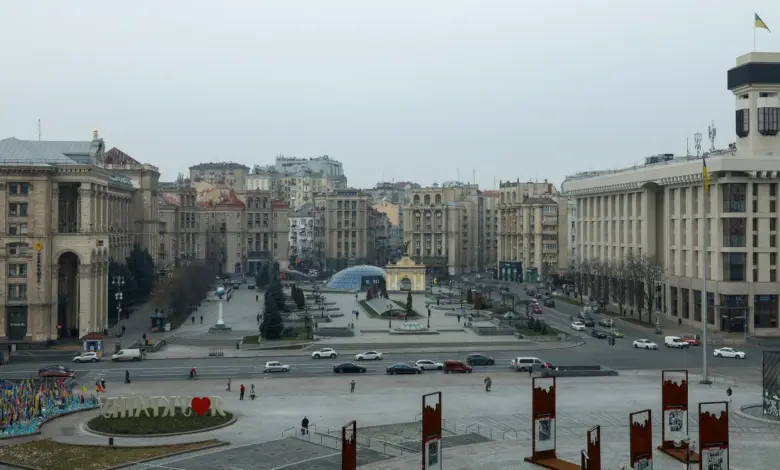
Iryna Danilovich disappeared while returning from work in April 2022. It would be two weeks before Russian authorities admitted she was in their custody. The human rights activist and nurse was detained in the Russian-occupied Ukrainian peninsula of Crimea, accused of illegal possession of explosives and sentenced to seven years in prison. In her trial, Danilovich testified that she was tortured during her detention.
She has since been deported to a notoriously cruel women’s penal colony in Zelenokumsk, southern Russia. She suffers from constant headaches and her health continues to deteriorate – yet she is not allowed to sit or lie down during the day, according to human rights monitoring group Zmina.
Ukraine has always called its areas under Russian control “temporarily occupied territories,” insisting it will eventually regain control over them. But that hope is being crushed now. This week, US President Donald Trump suggested it was “unlikely” Ukraine would get back much of its occupied land in the peace negotiations he intends to hold with Russian President Vladimir Putin. Danilovich’s case – and she is just one of thousands Kyiv says are detained in Russia – shows what is at stake for Ukraine.
Trump’s comment came after he held a 90-minute phone call with Putin on Wednesday, and it sparked panic across the country, where few believe Putin would negotiate in good faith.
Yuliya Kazdobina, a foreign policy expert at Ukrainian Prism, a think tank, said she doesn’t believe the Russian leader wants peace.
“We already had so many years of negotiations with the Russian side,” she said. Russia has a history of striking and violating agreements with Ukraine going back decades. In 1994, Ukraine agreed to give up its nuclear weapons in exchange for guarantees from the United States, United Kingdom and Russia that they would respect Ukraine’s sovereignty and territorial integrity. In 2015, after illegally annexing Crimea and sparking the conflict in eastern Ukraine, Moscow signed a ceasefire agreement only to then repeatedly violate it and then launch a full-scale invasion of Ukraine seven years later.
“We know that Russia is very duplicitous, and they can play nice, but when it comes to actually making concessions and making peace, they never… make any concessions,” Kazdobina told CNN.
The view from Kyiv
Ukraine’s President Volodymyr Zelensky responded to the Trump-Putin call by saying his country would not accept a peace deal struck between the US and Russia without Kyiv’s involvement.
“As an independent country we simply cannot accept any agreements without us. And I articulate this very clearly to our partners. We will not accept any bilateral negotiations on Ukraine without us,” Zelensky said, adding that the fact that Trump spoke to Putin first was “not pleasant.”
And Ukrainians seem to agree with their leader. Speaking to CNN in Kyiv, student Nazar Voloshenko said that any talks that could lead to Ukraine losing further territory would be disastrous for the country.
“We may be left without the currently temporarily occupied territories, without parts of the Kherson region, Zaporizhzhia region and the long-suffering Crimea,” he said. “We must take back what is rightfully ours.”
Russian forces currently occupy nearly 20% of Ukraine’s territory, up from the roughly 7% it controlled before launching its unprovoked full-scale invasion nearly three years ago.
According to Ukrainian officials, some 6 million people, including 1 million children, live under Russian occupation, in what the United Nations has described as a “bleak human rights situation.”
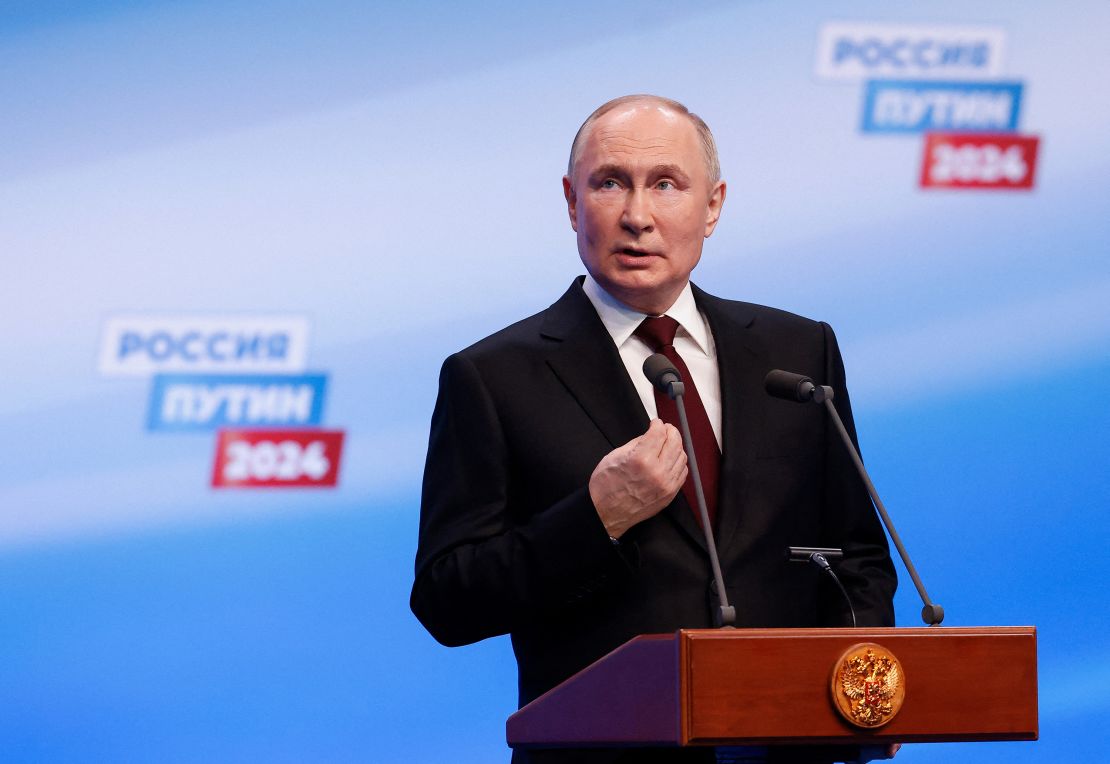
Fears of history repeating itself
Crimea has been under Russian control since Moscow illegally annexed it in 2014. Since then, Russia has imposed a brutal and repressive regime, stomping out any sign of opposition.
Maksym Vishchyk, a lawyer at Global Rights Compliance, a non-profit that advises the Ukrainian authorities on investigating and prosecuting international crimes, said Moscow has repeated the same pattern across other occupied territories.
“When Russia occupied the Crimea peninsula, it commenced a campaign of systematic targeting of communities or individuals it perceived as those who became an obstacle in the Russification campaign … with devastating effects on the social fabric in general, but also communities, families and individuals,” he told CNN.
“And Crimea has been kind of their playbook. Policies and patterns and tactics (Russia) applied in Crimea were then applied as well in other occupied territories. So, we see essentially the same patterns in all occupied territories, both since 2014 and since 2022.”
The UN Human Rights Monitoring Mission in Ukraine has repeatedly reported the myriad human rights violations committed by Russia in occupied Ukraine – from unlawful detentions to sexual abuse to forcing people to accept Russian citizenship and sending their children to Russian schools and training programs.
Russia has repeatedly denied accusations of human rights abuses.
A dangerous precedent
Financial consultant Oleksandr Sokhatskyi told CNN he thinks any deal would be unacceptable if Ukraine’s borders are changed from what they were before the war because of the human cost of years of unnecessary battle.
“Given how many victims this war has already had, and to end it on someone else’s conditions… then why did these (Ukrainian soldiers) die and why did they defend these territories?” he said.
Soldiers fighting on the frontlines were likewise skeptical that negotiations between Trump and Putin could yield a result that would be palatable to many Ukrainians.
Volodymyr Sablyn, a battalion commander in the 66th mechanized brigade, who is fighting near Lyman in the east of the country, said that having Russia take over some of Ukraine’s territory could have dangerous consequences.
“It will set a precedent and show Russia that they can attack any country, take its territory and make it theirs with impunity in the future,” he said, adding that Russia could soon turn their focus on other smaller countries in its vicinity.
Putin has repeatedly made his goals clear: He wants to gain control over the entirety of Ukraine’s eastern Donetsk and Luhansk regions. But many in Ukraine are worried that even if he initially agrees to a ceasefire, he will ultimately instigate further fighting to achieve his endgame.
“No one and nothing will stop Putin from attacking us again and occupying another region or several more. If Europe and America don’t help us, then making peace now will most likely lead to war in a few years,” Sablyn said.
Dariya Tarasova-Markina contributed to this report.


